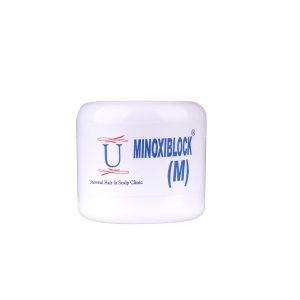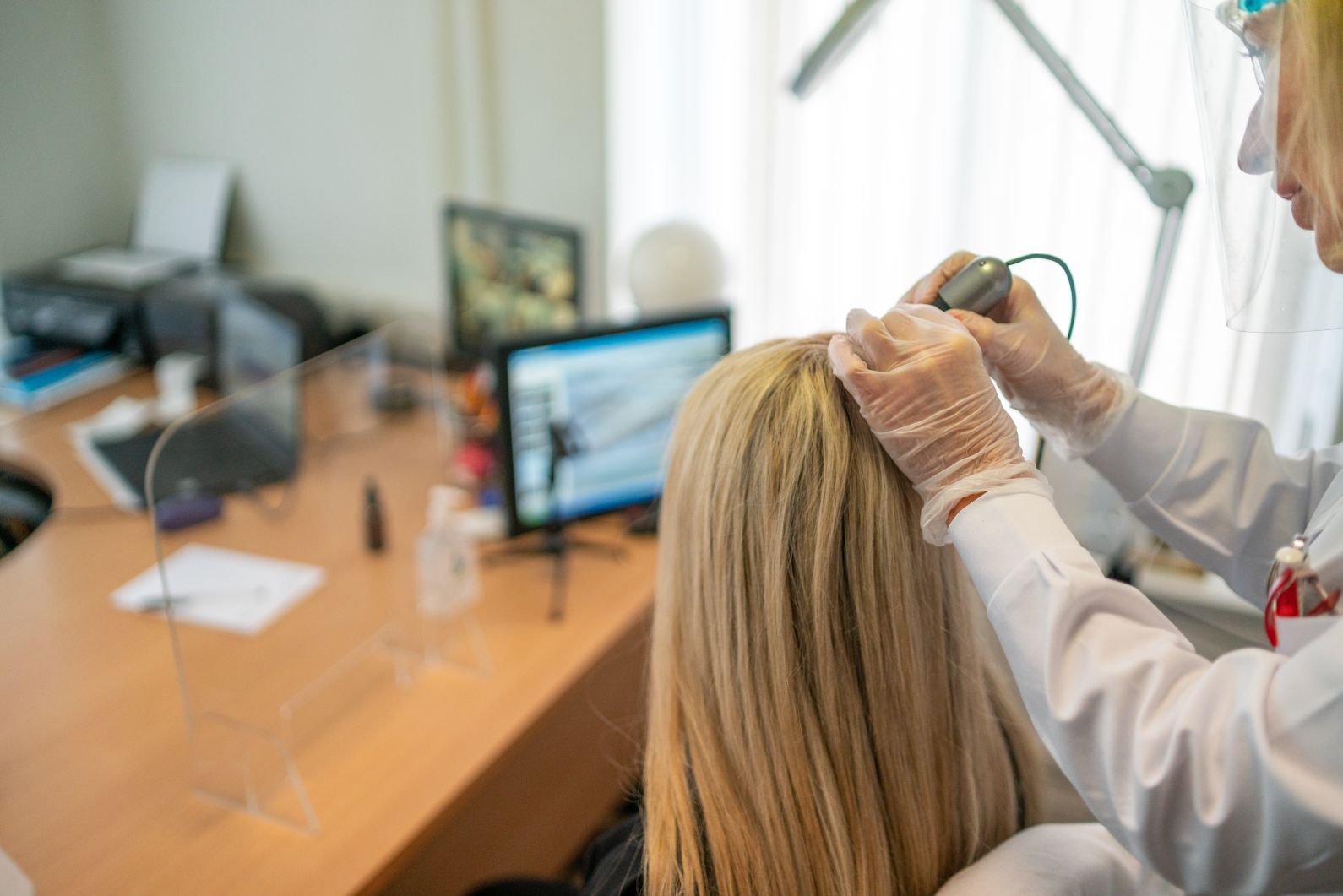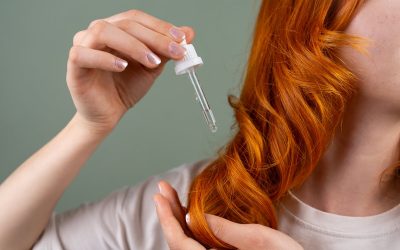We live in a fast-paced world, constantly juggling deadlines, relationships, finances, and many other demands. High stress has undoubtedly become an unavoidable part of our daily lives. It, unfortunately, brings along with it several adverse effects, one of them being hair loss or alopecia.
In Dublin, like in many parts of the world, the number of people dealing with stress-induced hair loss, commonly known as telogen effluvium, is on the rise. It occurs when a significant number of hair follicles go into the telogen (resting) phase due to stress or shock.
If you are grappling with diffuse thinning or patchy baldness after a major life event, then you might be part of the growing statistics. But fret not, as with the right information and the help of a trichologist, you can get your mane back!
Can Stress Really Cause Hair Loss?
There is an established correlation between chronic stress and hair loss, a claim supported by extensive scientific research. High stress levels increase cortisol and other hormones, interrupting the normal hair cycle, leading to excessive daily hair shedding of up to 3 times the average amount.
Under normal circumstances, hair undergoes a natural cycle of growth and rest. This process entails an anagen (active growth) phase and a telogen (resting) phase. However, when a person experiences high levels of stress, the hair follicles may prematurely enter the telogen stage, halting active hair growth.
This shift is a typical part of the hair cycle, but persistent stress can unnaturally extend this rest phase. After a certain amount of time, when the body re-establishes its balance, the hair follicles re-enter the anagen phase, resulting in a “hair shedding” event. This coordinated shedding leads to noticeable, often alarming, hair loss.
Excessive hair shedding is a common physiological reaction to chronic stress. It’s the body’s attempt to preserve energy during perceived periods of crisis by diverting it from non-essential services, such as hair growth.
Prevention and proper management of stress-induced hair loss are critical, as early identification can help prevent significant hair loss and potential baldness. Furthermore, understanding the triggering factors can offer crucial insights to help create more effective treatment plans.
How to Know If You Have Stress-Induced Hair Loss
Determining whether your hair loss is a result of stress can be tricky, as other conditions like thyroid disorders or nutritional deficiencies can also cause excessive shedding. But there are a few signs that may indicate your alopecia is related to high stress levels.
One of the primary symptoms of stress-induced hair loss is noticeable hair shedding following a major stressful event. These severe emotional or physical stressors include major surgery, trauma or illness, extreme dieting, nutrient deficiencies, childbirth, and psychological stress from significant life events. Excessive hair shedding happens weeks or even months after the stressful event.
Additionally, telogen effluvium involves diffuse thinning that starts suddenly and affects the whole scalp. There is no noticeable pattern in the hair loss, unlike in androgenetic alopecia. With prolonged stress, noticeable thinning can also occur around the temples and crown area.
Pay attention to any correlation between increased shedding episodes and high-stress periods. If possible, keep a hair journal to track loss patterns.
It’s important to note that these symptoms can also be indicative of other health problems or types of alopecia, not only stress-induced hair loss. As such, seeing a trichologist or hair specialist is crucial for a thorough evaluation and accurate diagnosis.
Will Hair Lost Due to Stress Grow Back?
Hair shedding due to stress is typically temporary. Moreover, the prospect of hair growth after this experience is quite promising.
As mentioned earlier, when the body undergoes periods of intense stress, it often redirects its resources to functions it considers more important for survival, which can, unfortunately, lead to hair loss. However, once the source of stress is identified and managed appropriately, the body redistributes its resources. It encourages the hair follicles to shift back from the telogen phase to the anagen or growth phase.
In fact, hair regrowth usually begins as soon as the stressful event or period has passed. Hair restoration can take several months due to the cyclic nature of hair growth, but steady progress is generally seen within six to nine months. This process may be slower for some individuals, and it’s normal for it to take several months to a year for the hair to return to its usual thickness and length.
It is worth mentioning that while telogen effluvium is reversible, it can become severe if not treated early and properly. Worse, the hair loss can become permanent. So, it’s important not to delay seeing a reputable trichologist in Dublin if you suspect you are suffering from alopecia.
Treatments for Stress-Induced Hair Loss in Dublin
In most cases of stress-induced hair loss, the primary emphasis should be eliminating the triggering stressor. Often, once the stressor is addressed and mitigated, hair loss stops without the need for specialised treatments.
To support the regrowth process, you can adopt lifestyle changes such as a balanced diet, regular exercise, and adequate sleep. Enriching your diet with hair-healthy nutrients like protein, zinc, iron, and vitamins can further aid in hair restoration. Of course, employing stress reduction techniques, including meditation, deep breathing, yoga, or any other form of relaxation, can also prove beneficial.
If hair loss persists despite eliminating triggers and adopting these lifestyle improvements, various alopecia treatment options in Dublin are available.
Medications
Certain topical medications can be applied to the scalp to stimulate hair follicles, while oral medications can be taken to help inhibit the hormone that causes hair loss.
Laser Therapy
Laser hair growth therapy, including at-home devices, uses LEDs to stimulate hair growth. It does this by reducing inflammation in follicles that stop them from regrowing.
Microneedling
Microneedling is a dermatological procedure that uses tiny needles to create small wounds on the scalp. This procedure helps stimulate collagen production and encourage new hair growth.
Platelet-Rich Plasma Therapy (PRP)
PRP involves injecting your own blood plasma into your scalp to stimulate hair follicles and promote hair growth.
Psychological Support & Stress Management Techniques
Therapeutic interventions such as Cognitive Behavioural Therapy (CBT) or mindfulness practice could also be valuable for managing underlying stress issues.
Hair Transplant Surgery
In cases of significant hair loss, where other treatment options do not bring about necessary improvement, hair transplant surgery can be considered. It involves moving hair follicles from a part of the body with ample hair growth to the balding parts of your scalp.
While these hair loss solutions can be effective, it’s important to have a professional consultation before starting any treatment. Trichologists and dermatologists can help formulate a personalised treatment plan considering all aspects of your condition and lifestyle. Through comprehensive evaluation and treatment, hair restoration in Dublin can become a feasible goal for anyone with stress-induced hair loss.
How to Prevent Stress-Induced Hair Loss or Telogen Effluvium
Stress-induced hair loss can affect anyone, although certain risk factors may increase susceptibility. For example, people with high-stress jobs, who have recently experienced a traumatic life event or major illness, or who are crash dieting are at a higher risk of experiencing excessive hair shedding.
While you can’t control every source of stress, you can take proactive steps to reduce their impact on your hair and overall well-being. How? Here are some tips:
Prioritise a Balanced Lifestyle
Ensure you get sufficient sleep, regular exercise, and a nutritious diet to provide your body and hair with essential nutrients and energy. This balanced approach lays the foundation for healthy hair growth and stress management.
Incorporate Relaxation Techniques
Practice self-care through activities like meditation, therapy, or journaling to help manage stress and anxiety. These practices promote emotional well-being. It could also potentially reduce the impact of stress-induced hair loss.
Build a Strong Support System
Establishing a support network of friends, family, and mental health professionals can make coping with challenging times more manageable. A solid support system will not only help you navigate difficulties but also create a conducive environment for hair well-being.
Stay Mindful of Your Hair Care Routine
Adopting a gentle hair care regimen, such as using milder shampoos and conditioners, avoiding tight hairstyles, and limiting the use of heat-styling tools, can prevent further damage to your hair and scalp.
Although certain risk factors might be unavoidable, making your health and well-being a priority allows you to handle stressors better when they arise. Implementing these preventative measures can reduce the chances of stress leading to more severe conditions like depression or permanent hair loss. By minimising risks and equipping yourself with the right coping tools, you can achieve great hair and mental health.
In conclusion, telogen effluvium is a physiological reaction to the high-stakes, high-stress world we live in. The link between chronic stress and hair loss is backed by extensive scientific research. It’s evident that effective stress management is essential to mitigating its effects on your hair health.
However, while stress-related hair loss can be a daunting experience, it is not a lost cause. Solutions ranging from lifestyle adjustments to medical treatments can help restore not only your hair but also a sense of normalcy in your life. Understanding the causes, identifying the symptoms, and seeking timely professional help puts you back in the driver’s seat in your journey to regaining a healthy mane.
Remember, losing your hair to stress doesn’t have to mean losing your confidence. With the array of alopecia solutions at your disposal, you’re well-equipped to reclaim your full, healthy hair and improve your self-esteem and well-being.
Are stress and hair loss impacting your life more than you’d like? Looking for an effective solution to regain your mane? Begin by consulting a trusted trichologist in Dublin who can accurately assess your situation and create a tailored alopecia treatment. Call us today on +353 (0)1 679 3618 and schedule your initial consultation!
Royalty-free image supplied from Pexels as part of the SEO service from 3R






